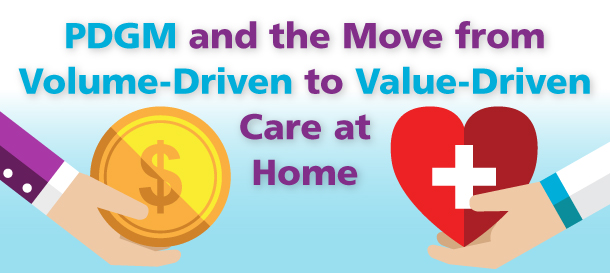
The Patient-Driven Groupings Model, or PDGM, will go into effect on January 1, 2020. PDGM is an updated version of the Home Health Groupings Model (HHGM) previously introduced by the Centers for Medicare & Medicaid Services (CMS) and then discontinued in 2017. According to CMS, PDGM is an effort to reduce the cost of home healthcare delivery and encourages value over volume, removing incentives to provide unnecessary care. PDGM also makes changes to the home health unit of payment, from 60 days to 30 days. Through these changes, CMS hopes to empower patients, increase competition, and foster innovation in the home health space.
A Paradigm Shift: How Will Your Home Health Perspective Change?
Historically, in volume-driven care or the fee-for-service model, home healthcare providers received one payment for all of the services a patient may need during a period of time, regardless of the number of instances of care a patient may need. Volume-driven care provided little to no emphasis on improving quality or overall health for patients.
Value-driven care is based upon improving patient outcomes and reducing the effects of and incidents resulting from chronic health conditions. CMS believes this will lead not only to better care for individuals, but improved health care for communities, and an overall reduction in costs. Value-based care rewards providers for helping patients improve their health at a lower cost.
How PDGM Impacts Referrals
Under PDGM, referrals from institutions (skilled nursing facilities and hospitals) will receive preference over referrals coming from community sources (physicians).
How Can In-Home Care Agencies Prepare for PDGM?
Being ready for this change is vitally important and these steps can help make sure your agency can hit the ground running in January 2020:
- Education. All home health agency staff should have a thorough understanding of PDGM. Not only what it is, but why it’s happening and how the shift will impact the types of clients the agency serves, as well as the ways in which client outcomes will be measured. There are many helpful and reputable online training resources available that will provide agency staff with this important educational foundation so that everyone moves into 2020 fully informed.
- Training. All home health agency staff members should know how PDGM will impact referral sources and how that shift changes the strategies that inform sales and recruitment strategies. Train staff to be ambassadors for your agency and equip them with the knowledge to confidently explain what sets your agency apart from the competition
- Planning. Plan ahead in sales and recruitment strategies. Are there opportunities to strengthen your home health agency’s relationships with institutional referral sources or to establish new relationships? Are there community referral sources that can help make up for a decrease in client numbers? Strategize with your sales staff in order to develop plans and goals to make sure you are maximizing your recruitment efforts.
- Communication. PDGM will undoubtably cause some growing pains for home health agencies. Non-medical home care agencies should take the opportunity to educate themselves on PDGM and keep lines of communication open with home health agencies. Consider ways in which you can work together to navigate these changes in order to continue your referral relationship and work to meet client health goals.
- Marketing. What type of outreach can your home health agency do to let local referral sources know you are ready for the PDGM change and can help meet client health goals? Consider a regular enewsletter targeted to referral sources, lunch and learn types of events, and of course, face-to-face meetings where you have the opportunity to explain your value
- Staffing. From care staff to the office team, be sure that you have the right people in the right roles. Consider the goals you have set for your agency and ensure that staff are properly trained to help you meet those goals. With PDGM on the horizon, look at how your agency fits into the new model and determine if you have gaps in your staffing, and how filling those may make your agency more competitive.
corecubed, an award-winning elder care marketing firm, offers a wide range of services designed to position your home care agency for success in spite of the changes in the industry. From branding and SEO to sales training and mystery shopping, corecubed harnesses its deep industry expertise to help your agency stand out from the competition and successfully navigate the ever-changing home health care landscape. Reach out to us today to learn more.
